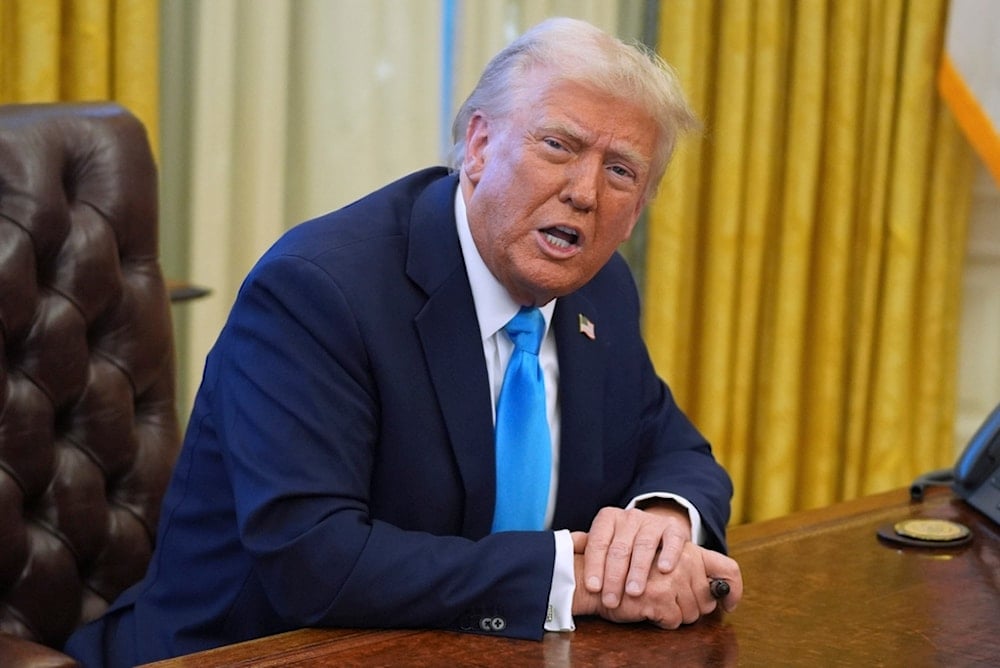Trump says not in a hurry to speak with Xi amid tariff war
US President Donald Trump proclaims that he is in no hurry to speak to Chinese President Xi Jinping in light of the ongoing trade war started by Washington.
-

President Donald Trump speaks to reporters as he signs executive orders in the Oval Office of the White House, Tuesday, Feb. 4, 2025, in Washington (AP)
US President Donald Trump said on Tuesday he is in no rush to hold talks with Chinese President Xi Jinping as tensions between Washington and Beijing escalate following his administration’s sweeping 10% tariffs on all Chinese imports.
China responded on Tuesday with targeted tariffs on US goods and warned that several American companies, including Google, could face possible sanctions. When asked about Beijing’s retaliatory measures, Trump dismissed concerns, saying, "That's fine."
A direct conversation between Trump and Xi is seen as a potential step toward easing tensions, similar to how discussions with Mexican and Canadian leaders helped delay tariffs earlier this week. However, White House spokeswoman Karoline Leavitt said no call had been scheduled yet.
"President Xi did reach out to President Trump to speak about this, maybe to begin a negotiation. So we'll see how that call goes," Leavitt told Fox Business Network.
China’s measured response suggests an attempt to keep negotiations open while avoiding a full-fledged trade war. According to Capital Economics, a UK-based research firm, Beijing’s additional tariffs affect roughly $20 billion in annual US imports, compared to the $450 billion worth of Chinese goods targeted by Trump’s tariffs.
"The measures are fairly modest, at least relative to US moves, and have been calibrated to send a message to the US," said Julian Evans-Pritchard, head of China Economics at Capital Economics.
China responds in tit-for-tat
The US tariffs, which came into effect at 12:01 am ET on Tuesday (0501 GMT), prompted China’s Finance Ministry to announce new levies. These include a 15% tariff on US coal and liquefied natural gas (LNG), and 10% tariffs on crude oil, agricultural machinery, and certain cars, effective from February 10.
China also launched an anti-monopoly investigation into Google and added two US companies—PVH Corp (owner of brands like Calvin Klein) and biotech company Illumina—to its "unreliable entities list." Additionally, China’s Commerce Ministry and Customs Administration imposed export controls on critical materials like tungsten, tellurium, and ruthenium, necessary for industrial and clean energy applications, to "safeguard national security interests."
During his first term, Trump initiated a two-year trade war with China in 2018, driven by concerns over its trade surplus with the US and unfair practices. This conflict saw tariffs on hundreds of billions of dollars worth of goods, disrupting global supply chains and hurting the world economy.
Stocks in Hong Kong fell after China's retaliation, as Gary Ng, senior economist at Natixis, warned, "Unlike Canada and Mexico, it is clearly harder for the US and China to agree on what Trump demands economically and politically. Even if the two countries can agree on some issues, tariffs may continue to be used as a recurrent tool, which could lead to significant market volatility this year."
Trump pauses tariffs on Mexico, Canada
Meanwhile, Trump has placed a 30-day pause on his threatened 25% tariffs on Mexico and Canada after securing concessions on border and crime enforcement. The move highlights the administration’s shifting trade strategy, as it continues to exert pressure on China while seeking deals with other key trading partners.
Canadian Prime Minister Justin Trudeau and Mexican President Claudia Sheinbaum said they had reached agreements with Trump to step up efforts to combat crime and drugs, with Mexico deploying 10,000 National Guard members to its northern border. Canada will also ramp up efforts against organized crime and fentanyl trafficking.
As for Europe, Trump has hinted that the EU could be next, but EU leaders have stated they are prepared to retaliate if tariffs are imposed, stressing the importance of negotiations. The EU is America’s largest trade partner, and Trump suggested that Britain, having left the EU, might be spared from tariffs.
Trump acknowledged that tariffs may cause short-term pain for US consumers but insisted that it is necessary to curb immigration and narcotics trafficking while promoting domestic industries. However, ING analysts noted that the tariffs would cover nearly half of all US imports, a task that would require the US to dramatically increase manufacturing output, which is currently unfeasible.
Analysts warned that the tariffs could push Canada and Mexico into a recession and risk triggering stagflation in the US, characterized by high inflation, stagnant growth, and rising unemployment.

 4 Min Read
4 Min Read








